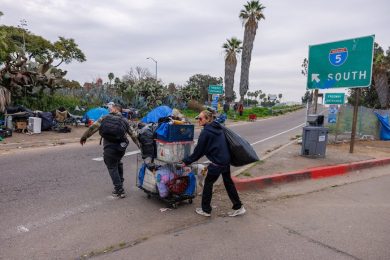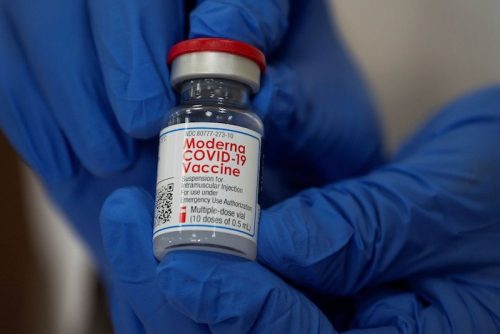The public health response to the novel coronavirus we have come to know as COVID-19 revolves around three aspects.

The first is now quite familiar: mitigation, to control the spread of the virus. For this, we mask, distance, wash hands, etc. The second aspect is treatment for those sickened. The third is gaining immunity from the virus. One way to do this is through vaccination, which has been a successful way to control or eliminate many debilitating or deadly diseases.
Vaccines have various origins, traditionally relying on a weakened or harmless form of the pathogen. More recently, molecular technology provided by advances in genetics can provide the effect of vaccination without using the pathogen itself.
Some vaccines are developed (and tested) using animal cells. Some use human cells taken from ethically-acquired umbilical cord or placental tissue. Others, as noted, do not involve the use of cells at all, but the synthesis of proteins that have the desired effect. These three origins of vaccines do not carry ethical objections.
A fourth source for vaccines, however, involves cell lines that originated with tissue from two aborted fetuses some 60 years ago. Guidance from the Vatican’s Pontifical Academy for Life in 2005 (updated in 2019), and the 2008 Instruction “Dignitatis Personae” from the Congregation for the Doctrine of the Faith addresses this concern in detail.
In summary, these documents permit the use of such vaccines under a specific set of considerations: the disease and its potential impact on individual and communal health is proportionately grave; there is no alternative vaccine; one does not condone or accept the vaccine specifically because of its tainted origin; and the vaccine in question is sufficiently “causally remote” from the immoral origin.
“Causally remote” here means that the two abortions in question (giving rise to two cell lines) took place in the early 1960s. After the many thousands of generations of cells originating from that tissue, there are no actual descendant cells that were part of the fetal bodies. Further, the abortion did not take place specifically to develop the vaccine, and abortions are not done today to provide a continual source for these cells; the same cell line is self-perpetuating.
The Academy urges the faithful to pressure companies producing vaccines to create alternatives free of these concerns. The two vaccines that have shown the most promise for COVID-19 at this time — Pfizer/BioNTech’s BT162b2 and Moderna’s mRNA-127 — both rely on this genetic approach using messenger RNA and do not have ethical concerns in their origins. However, some concerns have been raised about testing.
Vaccine testing may at times use human cells for testing and production. The same ethical considerations apply to this aspect of vaccines, especially the remote causal distance from the tainted origin of cells and their use today.
In addition, vaccine testing requires appropriate informed consent for human trials and faces the challenge of testing in a sufficiently broad cross-section of the population (age, race, ethnicity, sex, its impact on pregnancy, and so on) to verify efficacy and safety.
In a health crisis, the need for speedy vaccine development must be balanced with adequate testing and time to uncover and monitor side effects. One factor in COVID-19 vaccine development is that research into the coronavirus has been ongoing for decades; while this is a “novel” form from this virus family, it is easier to develop an effective vaccine for this virus than for a completely unknown agent.
Once a vaccine is approved, its administration requires time, resources and the infrastructure to produce, ship, store and inoculate millions of people. Storage with the two molecular vaccines noted above is an added challenge due to necessary cold storage.
When supplies are limited in early stages, who should receive preference? A consensus is emerging that essential workers at greatest risk for infection due to their role (in health care and related basic services) along with those most at risk for serious illness (elderly populations and others with known comorbidities) should be the first priority. Factors genuinely independent of clinical realities are to be excluded; for instance, age, race, socio-economic status, or perceived social utility.
SHOULD A CATHOLIC ACCEPT VACCINATION?
This is a prudential decision that each must make for oneself and at times for those who depend on one’s decision (for example, children or those lacking decisional capacity due to mental status or disability). Mandates from the government to vaccinate all are not recommended as there are reasonable exceptions, and a mandate tends to reduce rather than foster compliance.
[perfectpullquote align=”left” bordertop=”false” cite=”” link=”” color=”” class=”” size=””]“Accepting a proven and safe vaccine is justified as a moral good, an act of solidarity and charity and arguably a work of mercy.“[/perfectpullquote]This decision must be informed by facts about the vaccine’s origin, safety and efficacy; one’s own risk for infection and the consequences for self and others if sickened; the severity of the illness and the public health crisis; the relative risk of side effects to the vaccine; availability; cost; and related factors.
While these are serious considerations, the refusal of vaccines may itself involve a degree of moral culpability, depending on the harms that are risked. Those who refuse a vaccine due to general concern about the relation of some vaccines to the use of aborted tissues have a stronger theoretical argument, but this must be fact-based in the context of the actual proposed vaccine. One must be cautious of adopting the same logic rightly criticized in the pro-choice position: that it is my body and my decision is a private one that is up to my own conscience. While Catholic teaching upholds and values autonomy and self-determination, it also understands that autonomy is not an absolute right but conditioned by the common good.
In the current situation, with a pandemic approaching its one-year anniversary and the widespread social, economic, educational and relational harms we have seen, and a significant portion of the population still at risk, accepting a proven and safe vaccine is justified as a moral good, an act of solidarity and charity and arguably a work of mercy.
Father Tom Knoblach is pastor of Sacred Heart in Sauk Rapids and Annunciation in Mayhew Lake. He also serves as consultant for health care ethics for the Diocese of St. Cloud.
Feature photo: A vial of the Moderna COVID-19 vaccine is seen in this Dec. 21, 2020, illustration photo. (CNS photo/Eduardo Munoz, Pool via Reuters)






















